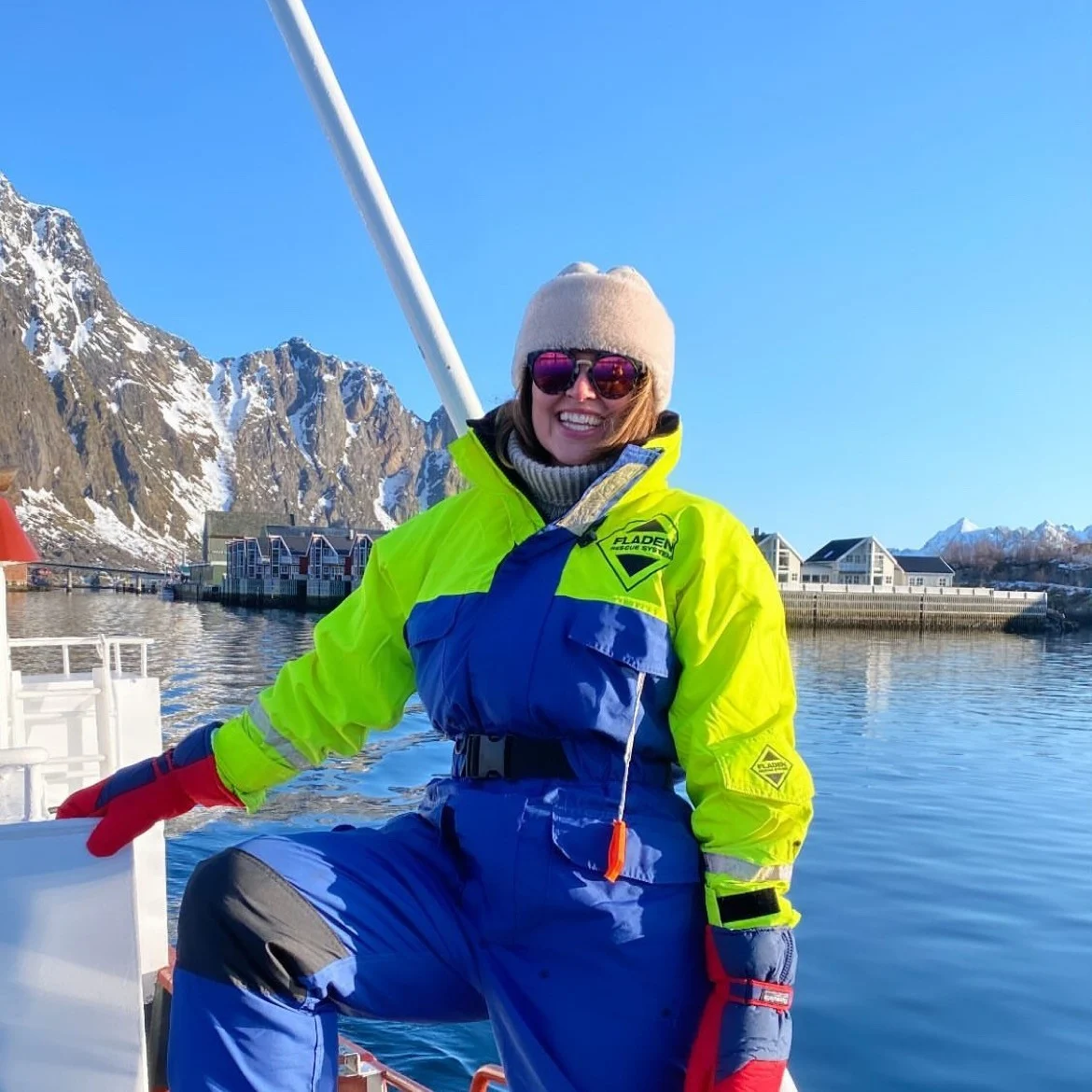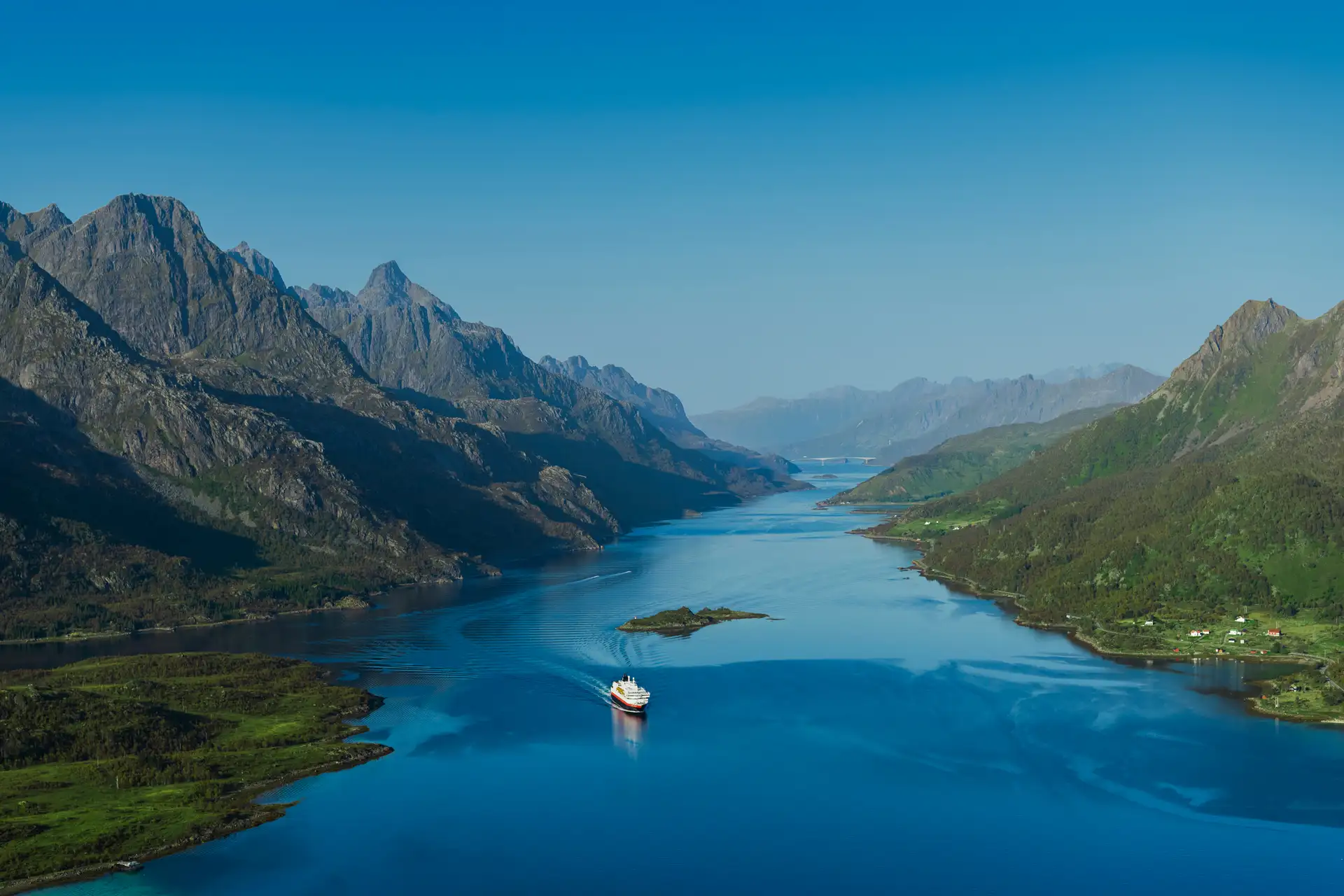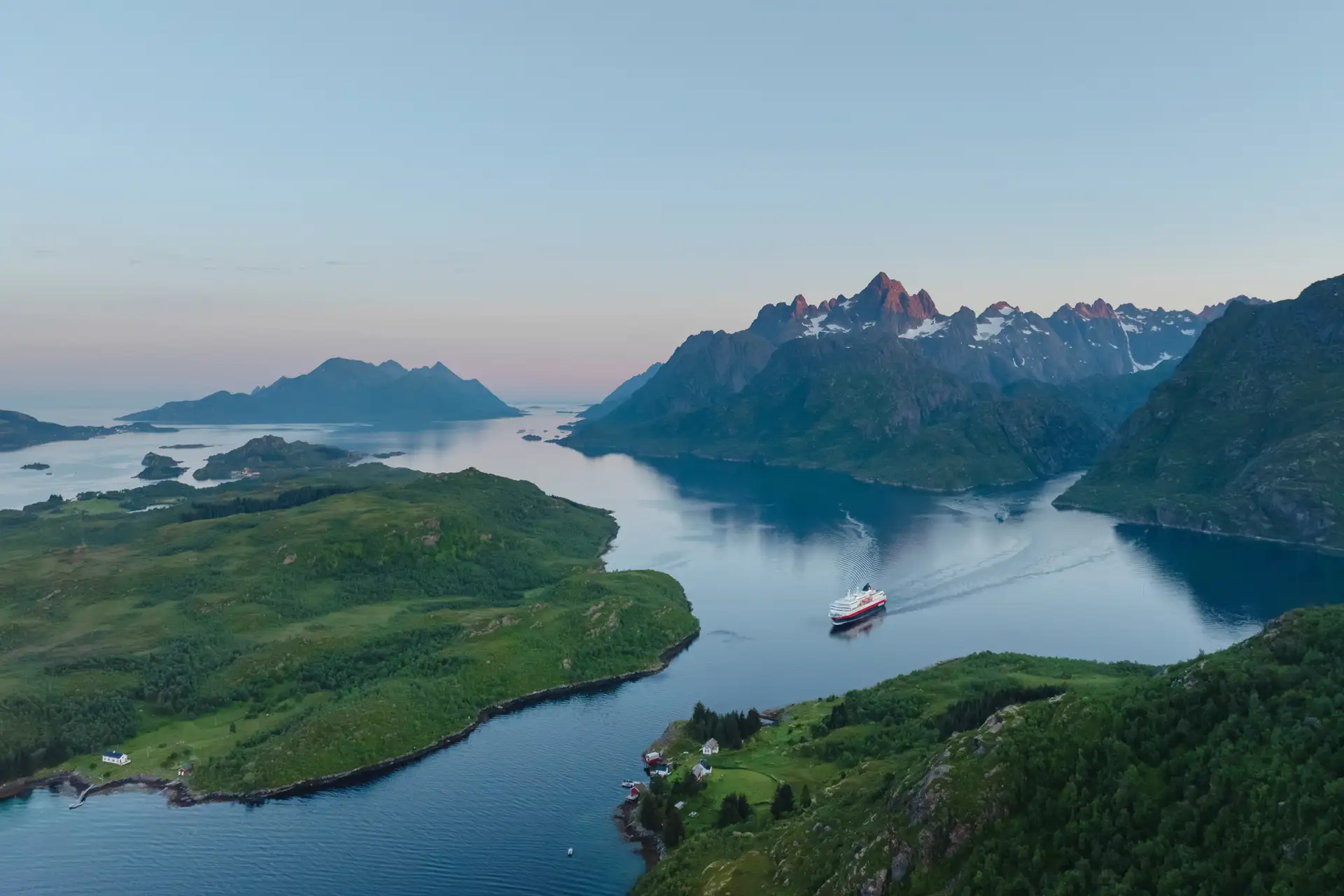Svolvær – gateway to the untamed Lofoten Islands
Welcome to a place of outdoor adventures, Northern Lights, and glistening fresh skrei (Arctic cod).

The largest town in the Lofoten Islands is the gateway to the archipelago’s towering peaks, crystal fjords, and enchanting fishing villages. Situated above the Arctic Circle, this is a prime place to catch those ethereal Northern Lights and experience the hazy Midnight Sun.
Svolvær town itself blends traditional charm with modern comforts for a warm welcome.
A short history of Svolvær
Just west of Svolvær lies a village called Kabelvåg. Originally named Vågar, this was the first major town to ever exist in northern Norway – a full 700 years before any others grew to a size worth recording.
It wasn’t until the 16th century that Svolvær entered the records. Its name was a blend of svalr meaning ‘chilly’ and vær meaning ‘fishing village’. Life here continued without much event until it appeared in major newspapers in 1890 thanks to a standoff between large fishing vessels and local fishermen over fishing rights in the fjord. Often referred to as the Svolvær Standoff, it inspired official moves to protect the rights of local fishermen.
During World War II, Germany seized several fisheries in Svolvær to steal stocks of fish oil to produce highly explosive nitroglycerin for bombs and shells. During Operation Claymore, a successful Norwegian/British raid carried out on 4 March 1941, code books and wheels for the Enigma machine – a cipher device the Germans used to encrypt top-secret messages – were discovered. From these, the Enigma code was finally deciphered at Bletchley Park in the UK. It marked a major turning point for the Allied war effort.
Still, the Gestapo kept their Lofoten headquarters in Svolvær. The town has the most surviving examples of German bunkers and tunnels in Norway.

Svolvær today
Today, Svolvær is a vibrant, modern town with a blend of Arctic charm and contemporary comforts. It serves as the tourism hub from which to explore Lofoten, offering stunning mountain and sea views, outdoor adventures like whale watching and hiking, and a rich cultural scene with museums, galleries, and restaurants.
The world’s largest catches of skrei (a type of Arctic cod that migrates from the Barents Sea to spawn along the Norwegian coast) are made on the Lofoten banks between January and April every year. The town also hosts the annual World Cod Fishing Championships at the end of March.
The best things to do in Svolvær

1. Brave Svolværgeita (The Goat)
It’s hard to miss the sight of these two rock formations shaped like goat horns that loom 590m above the town. Climbers from around the world come here to test their skills, with the daring leap between the horns offering the ultimate challenge. Even if you don’t brave the jump, the mountain offers incredible views of Svolvær and the fjords below.

2. Enjoy a sea eagle safari in Trollfjord
Don’t judge a fjord by its size. Nearby Trollfjord, a tiny 2.5km-long inlet, is a staggering beauty of Arctic Norway. So much so, that we even named our Signature flagship (MS Trollfjord) after it. The fjord is so narrow that only smaller vessels can fit, and Hurtigruten ships almost brush the sides of the 1,000m-high mountains. As you cruise, keep your eyes peeled for sea eagles, seals and, occasionally, a pod of orcas.

3. Fish for skrei
Fishing is one of the town’s most popular tourist activities. Board a traditional wooden-deck fishing boat at the harbor and, once on the water, dangle lines strung with red lures, like a string of fine red chilis, into the icy depths. Take in the scenery and wait to feel a snag.

4. Go kayaking in the fjord
Svolvær is one of Norway’s most popular kayaking destinations. The calm, crystal-clear waters offer a great opportunity for beginners to paddle round small islets, spot lines of bright-red rorbuer (stilted fisherman’s cabins), and take in the unmistakable scent of skrei as it dries on racks along the shore.

5. Visit Lofoten War Memorial Museum
History lovers will be in awe of this special display of rare photos and objects. It features Norway’s largest collection of uniforms, started by dedicated local William Hakvaag in 1996, and now housed inside the former post office.
(Image credit: Wolfmann/Wikimedia Commons)

In many ways, Svolvær is the world’s smallest big city. We only have 5,000 inhabitants, but such a large cultural offering of theatre, festivals and concerts. Did you know the famous musician Kari Bremnes, one of our country’s leading female singers, was born here? She was inducted into the Rockheim Hall of Fame in 2018.
What is the weather like in Svolvær?
| Jan | Feb | Mar | Apr | May | Jun | Jul | Aug | Sept | Oct | Nov | Dec | |
|---|---|---|---|---|---|---|---|---|---|---|---|---|
Average min temperature (°C) | -2 | -2 | -2 | 1 | 5 | 8 | 11 | 11 | 8 | 4 | 1 | -1 |
Average max temperature (°C) | 2 | 2 | 3 | 6 | 10 | 14 | 17 | 16 | 12 | 7 | 5 | 3 |
With sheer mountains knifing into Arctic fjords, the Lofoten Islands can seem otherworldly. It’s easy to assume Svolvær might exist inside an eternal frozen snow globe. In fact, it’s often as mild as mainland Europe in winter thanks to the Gulf Stream.
From early December to early January, the sun packs up and heads south. Temperatures hover around freezing until March but never plummet to the toe-scrunching temperatures experienced on mainland northern Norway. The long Polar Night provides an ebony backdrop against which the Northern Lights can glow all the brighter.

“You know it’s winter in the Lofoten Islands,” says local resident Isabel Odden, “when the air is filled with the smell of dried fish. We say it ‘smells like money!’”
Thanks to its location north of the Arctic Circle, the sun stops setting here in late May and doesn’t dip below the horizon again until mid-July. “I feel the ideal time to explore Svolvær is in summer,” says Isabel. “You can embrace the endless days and kayak under the Midnight Sun, or go for a hike at 2am.”
Visit Svolvær with Hurtigruten
SOUTHBOUND ON THE COASTAL EXPRESS
In port: 2 hours
We call at Svolvær in the early evening, allowing you to explore the town before heading back to the ship for dinner.
SOUTHBOUND ON THE SVALBARD LINE
In port: 4 hours
From May to September, we stop at Svolvær on the southbound leg of the Svalbard Line, our Signature voyage that sails from Bergen to the Arctic archipelago.
NORTHBOUND ON THE NORTH CAPE LINE
In port: 4 hours
In winter, we stop at Svolvær on the northbound leg of the North Cape Line, our premium, all-inclusive Signature voyage that sails from Oslo to the top of Europe and back.
Getting to Svolvær from your ship
Crossing Vestfjorden, Svolvær appears a mix of rorbuer – fishing huts – and glossy glass high-rises set against the hulking Fløyfjellet mountain. As we enter the harbor, look out for the Fiskerkona (Fisherman's Wife) statue greeting our arrival.
The ship docks in the center of town, giving you plenty of time to explore its charms.
Port address: Torget 22

Activities in Svolvær
The surrounding islands, steep mountains, beautiful beaches and sheltered bays offer opportunities to take part in a number of exciting activities.

excursions
RIB Adventure in Lofoten

excursions
Lofoten Scenery and Henningsvær

excursions
Kayaking in Lofoten - Summer
Choose you Svolvær voyage
Neighboring ports

Previous port
Stokmarknes
The picturesque island community that inspired our pioneering founder over 130 years ago.


Previous port on The Svalbard Line
Senja
With its fjord-indented coastline, varied scenery, and close-knit fishing communities, it’s no wonder Senja is known as ‘Norway in miniature’.

Next port on The Svalbard Line
Brønnøysund
A pretty little town rich in history and maritime atmosphere.

Previous port on The North Cape Line
Rørvik
The maritime splendour of Rørvik and its surroundings is an attraction in itself.

Next port on The North Cape Line
Tromsø
In this Arctic city, snow-filled adventures, Arctic wildlife, and vibrant festivals flourish beneath the Northern Lights and Midnight Sun.


